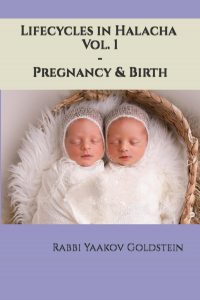
Lamnatzeiach Ye’ancha-The Segula of reciting the Mizmor of “Lamnatzeiach Ye’ancha” during pregnancy prior to retiring to sleep:[1]
Throughout all the days of a woman’s pregnancy, the husband[2] is to say the Psalm of Lamnatzei’ach Ya’ancha [Kapital 20, printed between Ashreiy and Uva Letziyon] prior to sleep.
Repeating the verse of Ya’ancha: At the conclusion of the paragraph, the verse of Ya’ancha is to be repeated a second time.
Where:[3] The Psalm is to be recited within the recital of the bedtime Shema, prior to the blessing of Hamapil.
Being discreet:[4] One is to be discreet about this custom.
The Kavanos:[5] When reciting the above paragraph, one should do so with intent that G-d accept his recital as if it was done with all the proper [Kabbalistic] intents.
Beli Neder:[6] The above is to be done without it taking the status of a vow, [and hence one should explicitly intend to do so Beli Neder when first beginning this custom].
__________________________________________________________[1] Instruction of Rebbe recorded in letters: Igros Kodesh Vol. 4:454; 492; 5:105; 220; 6:104; Heichal Menachem 3:190; Minhag Chabad recorded in: Koveitz Minhagei Chabad Inyanei Hirayon p. 13; See Chosen Yeshuos 1:90 footnote 4; Shevach Habris 1:23
Source of custom: While I have yet to find this custom recorded in reference to pregnancy, it is widely recorded in reference to birth. See Peri Eitz Chaim Shaar Kerias Sefer Torah 4 and Sefer Toldos Yaakov of Maharam Gabaiy and Siddur Arizal and Avodas Hakodesh of Chida “This Mizmor is good for arousing mercy on behalf of the woman giving birth as it has nine verses corresponding to the nine months of pregnancy, and contains seventy words corresponding to the seventy contractions of a woman giving birth”; See Yesod Veshoresh Havoda Shaar Hachamishi, Shaar Hakarban in name of Abudarham that “This Psalm is a Segula to be said during a difficult birth, as this Psalm contains 9 verses corresponding to the nine months of pregnancy.”; Likkutei Mahrich 3 in name of Midrash Talpiyos Erech Leida
[2] In all the letters of the Rebbe, the Segula is written in reference to the husband. Possibly however, this does not come to exclude the wife, and hence she is to also say it. Vetzaruch Iyun.
[3] Igros Kodesh ibid
[4] Igros Kodesh 5:105 [Vetzaruch Iyun as to the reason and meaning behind this.]
[5] Igros Kodesh ibid
[6] Igros Kodesh 5:105



Leave A Comment?
You must be logged in to post a comment.